April 19, 2025 | 07:27 GMT +7
April 19, 2025 | 07:27 GMT +7
Hotline: 0913.378.918
April 19, 2025 | 07:27 GMT +7
Hotline: 0913.378.918
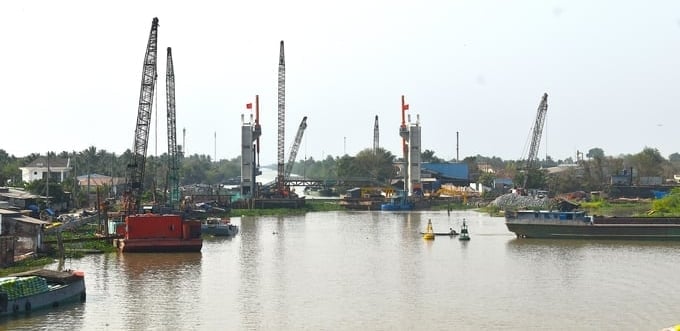
Nguyen Tan Thanh sluice helps 1.1 million people in Tien Giang and Long An provinces benefit. Photo: Minh Dam.
Alongside irrigation projects along the Tien River, the Nguyen Tan Thanh sluice, invested in by the Ministry of Agriculture and Rural Development, has effectively countered salinity intrusion, stored freshwater, safeguarded agricultural production for 80,000 hectares of farmland, and provided water resources for over 1.1 million people across the two provinces of Tien Giang and Long An.
In the latter half of March, as the weather grows sultry and hotter, the Mekong Delta enters the peak of the 2024 dry season. Saltwater infiltrates deep into the estuaries of the Mekong River. Salinity prevention sluices are closed, including the Nguyen Tan Thanh culvert situated at the canal's outset in Binh Duc and Song Thuan communes (Chau Thanh district, Tien Giang province), which is currently 80% constructed and being urgently operated to prevent the penetration of saltwater from the Tien River.
Over the past 20 days, the scorching weather has led to a rapid depletion of water levels in farmers' canal ditches. However, thanks to the abundant water source in the canal and ensured salinity levels, many farmers along the Nguyen Tan Thanh canal have utilized pumps to replenish their canal ditches and alleviate water shortages.
For over a week now, Mr. Cao Thanh Son, a resident working as a pond-bottom mud pumper in Dong Hoa hamlet, Song Thuan commune, has been operating rented water pumps for numerous households in the area. Mr. Son's rented water pumping team comprises four individuals operating two pumps. He charges an hourly fee, with the first two hours priced at 150,000 VND per hour, and subsequent hours at 80,000 VND each. The pumping continues until the gardener feels satisfied and the operation ceases.

Deputy Minister of Agriculture and Rural Development Nguyen Hoang Hiep (white shirt) inspects the construction progress of Nguyen Tan Thanh culvert in March 2024. Photo: Minh Dam.
"These past few days, there has been a high demand for water pumping. Many households, located just a few hundred meters from the canal, cannot afford my services. Some days, I earn a few million dong, but on weekdays, it's around 500,000 to 600,000 dong," shared Mr. Cao Thanh Son. "Fortunately, the canal water levels are sufficient, pumping is smooth, and salinity levels are under control."
A few hundred meters away, Mr. Le Van Bay diligently dredged the ditch, preparing to rent a water pump to irrigate nearly three coconut palms. According to Mr. Bay, although he had previously stored water in the ditch, the prolonged hot weather necessitated frequent watering, quickly depleting the water reserve. Currently, the water level has dropped almost to the bottom of the ditch. With heavy watering, it is likely to dry out completely within three or four days.
"There's still plenty of water outside the canal; it's just that my garden is a bit far from the canal, making pumping a bit challenging. Nonetheless, we have to persevere; there's no other option," remarked Mr. Bay.
Ms. Nguyen Thi Hoang Yen, Vice Chairwoman of the Song Thuan Commune People's Committee, noted that the commune's agricultural production area spans more than 519 hectares, predominantly cultivated with coconut and sapo (sapodilla) trees – plants known for their resilience to salinity. As of March 19, the salinity levels at the beginning of the Nguyen Tan Thanh canal measured 2.35‰, while inside the culvert, it was recorded at 0.59‰, ensuring adequate water supply for residents' needs.
During the dry season, water usage surges, leading to rapid depletion of water levels. The operation of the Nguyen Tan Thanh sluice is crucial to maintaining water sources for agricultural production and daily life in the region.
Moving forward, the commune will continue to monitor drought and salinity levels in the canals, disseminating information to residents and advocating for canal dredging and freshwater storage. Residents must refrain from littering or spraying weeds into the canals, preserving the environment and water quality.
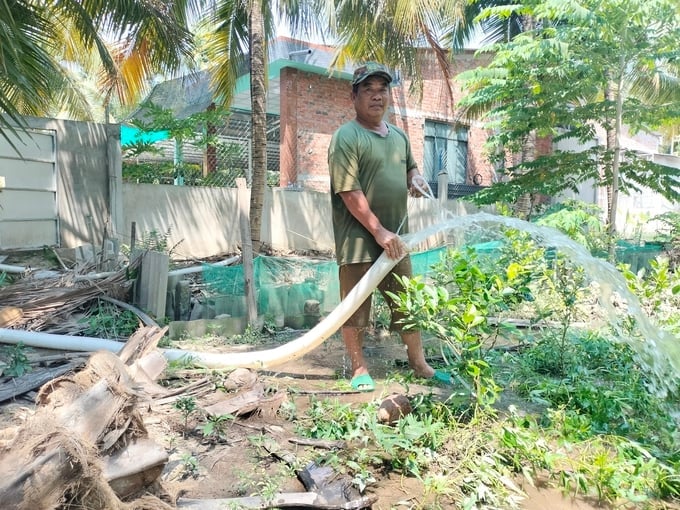
Mr. Cao Thanh Son pumps fresh water from the canal into the garden for people in need. Photo: Minh Dam.
"Initially, the project operation has been highly effective, ensuring that the canals in our commune maintain clean water. Thus far, there have been no complaints from residents regarding the water quality," added Ms. Nguyen Thi Hoang Yen.
The Nguyen Tan Thanh canal, situated in Chau Thanh district, begins at the Tien River and ends at the Nguyen Van Tiep canal axis. Spanning approximately 19 kilometers in length, with an average cross-section width of about 65 meters, this canal serves as the primary water supply axis for the Bao Dinh irrigation system (on the East coast) and the agricultural production areas of Chau Thanh district and Tan Phuoc district (on the West coast), encompassing an area of nearly 80,000 hectares. Additionally, it provides water resources for over 800,000 individuals in parts of Chau Thanh district, My Tho city, and the eastern districts of Tien Giang province (including Cho Gao, Go Cong Tay, Go Cong Dong, Tan Phu Dong, and Go Cong town). Simultaneously, it contributes to preserving freshwater and establishing a drinking water source for approximately 300,000 residents in Long An province.
According to Ms. Ngo Thi Con, General Director of BOO Dong Tam Water Plant Joint Stock Company (located in Binh Duc commune, Chau Thanh district, Tien Giang), the company specializes in supplying water to industrial facilities in the province, primarily in My Tho city and the freshwater districts of Go Cong and Tan Phu Dong island, with a daily capacity of about 65,000 cubic meters. Of this capacity, approximately 60,000 cubic meters are allocated to the Eastern region.
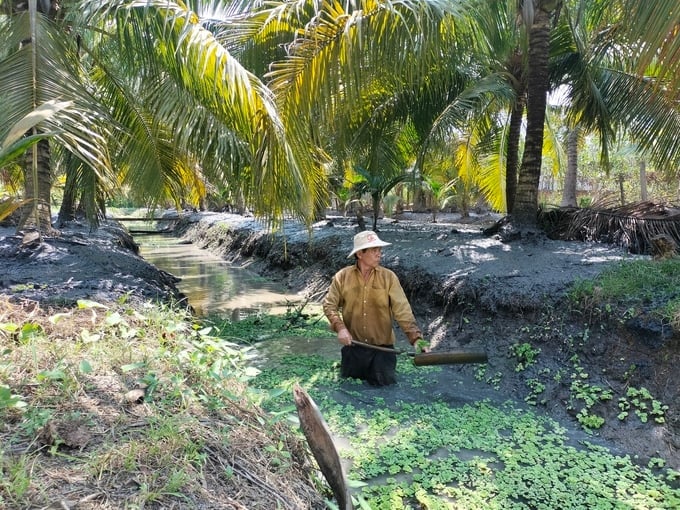
Mr. Le Van Bay dredged ditches to fill coconut roots and prepared to rent pumps to store fresh water to water the plants. Photo: Minh Dam.
Ms. Ngo Thi Con stated, "Every day, the company pumps approximately 40,000 cubic meters directly from the Sau Au canal (connected to the Nguyen Tan Thanh canal), operates around 10,000 cubic meters from drilled wells, and extracts water from the Tien River through decanters (cold water from the river when salinity levels are reduced for pumping), amounting to more than 10,000 cubic meters. In the foreseeable future, the company will primarily adhere to this operational plan."
In Tan Phu Dong district, the locality has historically faced challenges with freshwater scarcity during the dry season and salinity intrusion periods. However, in recent years, significant efforts have been made by the State to provide clean water to the residents of this island. The primary water source is derived from the BOO Dong Tam Water Plant, which serves as a crucial resource for the community.
Mr. Huynh Van Cam, from Tan Xuan hamlet, Tan Phu commune, Tan Phu Dong district, expressed his enthusiasm, stating, "We receive domestic water from the source in Dong Tam, ensuring quality. Previously, relying on water from the Tan Thoi pond was uncertain, but now, the water from Dong Tam is reliable. Additionally, I store four tanks of ten small jars. For cooking, we still use regular tap water."
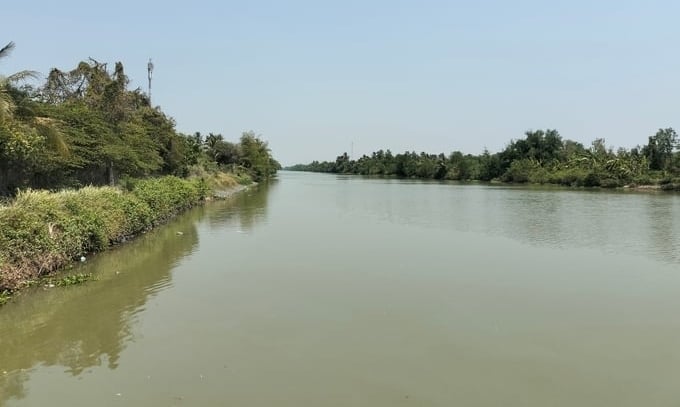
Raw water storage pond of Dong Tam Water Plant. Photo: Minh Dam.
Mr. Nguyen Ngoc Sang, an agricultural and cadastral officer in Phu Thanh commune, Tan Phu Dong district, affirmed, "The quality of drinking water here is excellent," noting the satisfaction of the 2,224 households comprising 8,110 residents in the commune.
According to Mr. Nguyen Duc Thinh, Director of the Tien Giang Irrigation Department, "At this juncture, the Nguyen Tan Thanh sluice gate has effectively prevented salinity intrusion and maintained a freshwater supply, enabling localities to actively access raw water to sustain the operations of the Dong Tam and Binh Duc water plants. Additionally, water availability in the main canal and level 1 canal remains consistent, ensuring continued water usage for the Eastern region."
In the upcoming period, to ensure a steady water supply for daily usage, the industry will advise the Provincial People's Committee to issue directives instructing water supply companies to implement solutions for water provision to the populace promptly. Additionally, in cases of source depletion, measures will be taken to transport and pump water to ensure that residents avoid water shortages during the 2024 dry season.
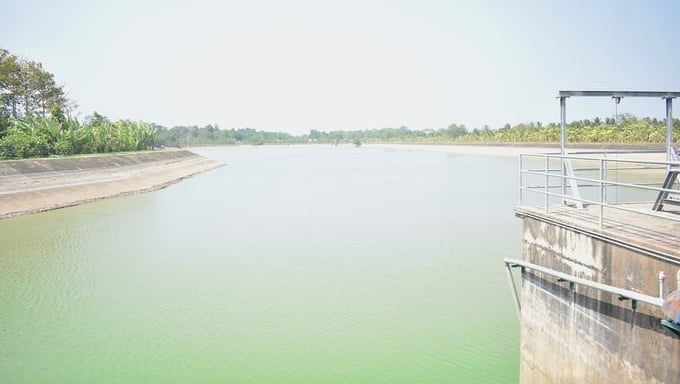
The water source on Nguyen Tan Thanh canal is abundant and the salinity is guaranteed to serve people's daily needs. Photo: Minh Dam.
Construction ahead of schedule
The construction of the Nguyen Tan Thanh sluice gate commenced in November 2022 at the onset of the Nguyen Tan Thanh canal, situated 420 meters from the Tien River, within the Song Thuan and Binh Duc communes (Chau Thanh district, Tien Giang). Initially projected for completion within 24 months, the project is now progressing ahead of schedule, with an anticipated completion date of July 2024. This investment in the sluice is expected to save Tien Giang province over 10 billion VND, which would otherwise be spent on constructing temporary steel dams to counter salinity during the dry season.
Mr. Bui Duy Lieu, Deputy Head of the Executive Board overseeing the Nguyen Tan Thanh Sewer Project, from the Irrigation Construction and Investment Management Board 10 under the Ministry of Agriculture and Rural Development, stated: "As of now, the project's progress stands at over 80%, with a forecast for basic completion by the end of July 2024. By August 2024, trial operations, training for operational personnel, and handover procedures will be carried out. Currently, construction efforts are focused on completing the boat lock, embankment wall, and sluice gate at both ends of the lock. The sluice has been sealed since March 1 to prevent saltwater intrusion and is expected to reopen on April 12. However, this timing may vary depending on local requirements and any unforeseen developments."
Translated by Quynh Chi
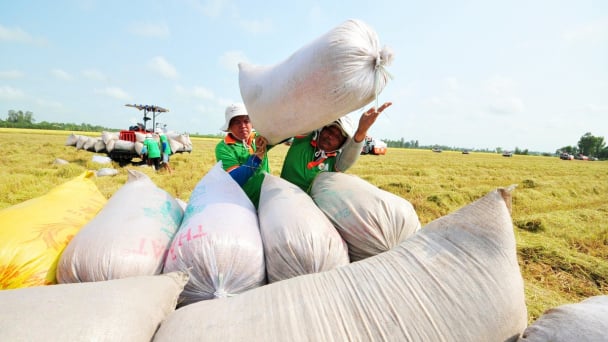
(VAN) The rice industry in the Mekong Delta is undergoing a major transformation, shifting toward sustainable, high-quality, and low-emission exports to meet the green and clean standards increasingly demanded by international markets.
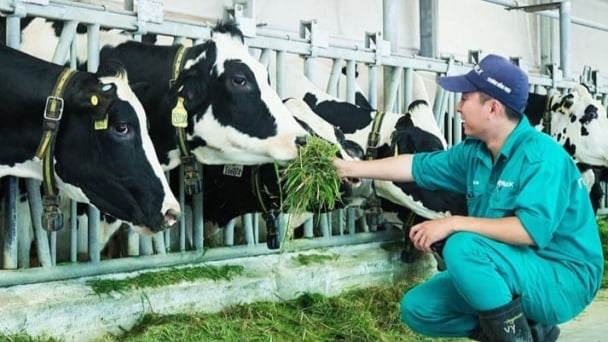
(VAN) According to Tong Xuan Chinh, Deputy Director of the Department of Livestock Production and Animal Health, Vietnam’s dairy cattle industry must overcome seven major challenges to achieve sustainable development.
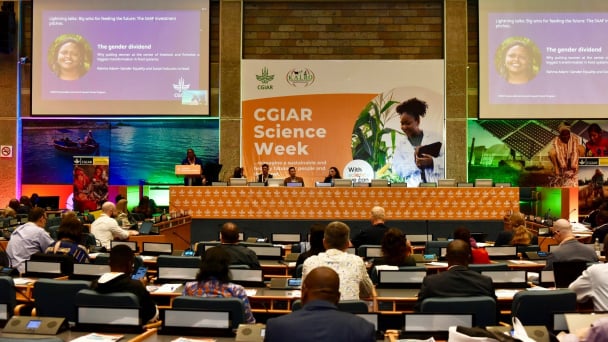
(VAN) The CGIAR’s Sustainable Animal and Aquatic Foods (SAAF) program represents a new approach that emphasizes the transformation of food systems toward sustainability.
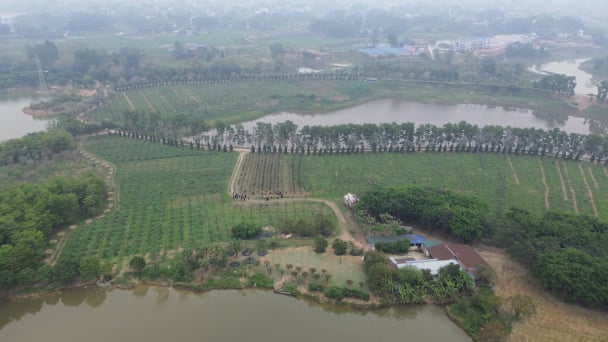
(VAN) Scientists assume that industrial agriculture has been 'outdated.' As a result, a comprehensive overhaul or a revolution in the direction of embracing ecological agriculture is needed.
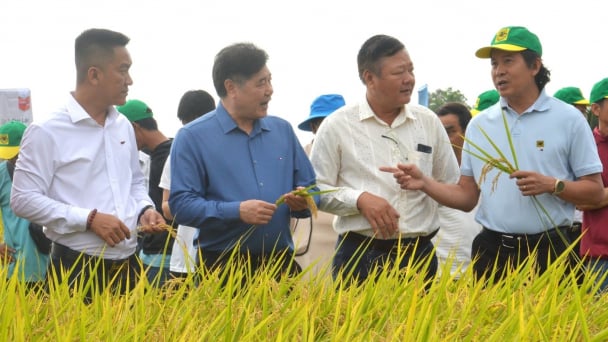
(VAN) The results from pilot fields are catalyzing the expansion of the One million hectares of high-quality, low-emission rice project in Kien Giang.
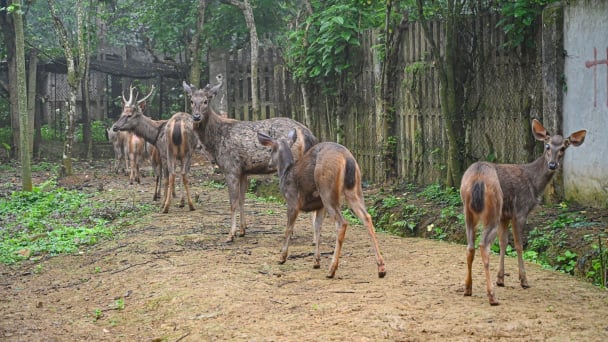
(VAN) On the morning of April 11, Cuc Phuong National Park received 18 individuals of endangered and rare wild animals from Da Nang city.
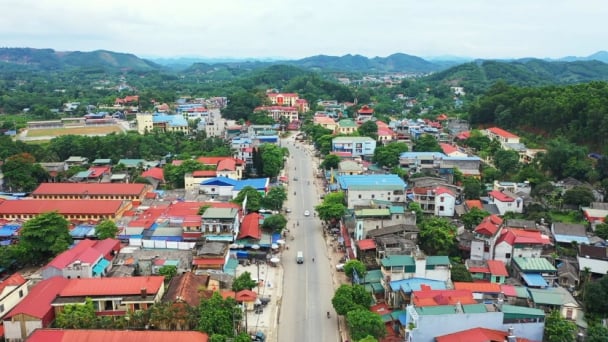
(VAN) FAO supports Vietnam in enhancing survey sampling techniques for the 2025 nationwide agricultural and rural census.